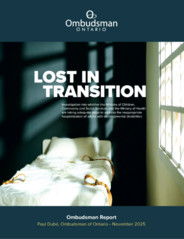Ontario Ombudsman Paul Dubé’s latest report, released on 25 November 2025, reveals how the province’s systemic failure to help people with complex developmental disabilities and high needs has left too many to suffer for unnecessarily long periods in hospital.
The Ombudsman’s investigation examined 55 complaints relating to adults with developmental disabilities inappropriately housed in hospitals for lack of appropriate housing and supports in the community.
The report, Lost in Transition, details the plight of seven individuals who languished in hospitals for years, waiting for appropriate housing and support as their life skills and behaviours deteriorated.
“This is simply unacceptable,” Ombudsman Dubé writes in his report. “Uniquely vulnerable members of our society are entitled to have their rights respected and to live with dignity in humane, compassionate conditions.”
The report highlights how inconsistent collaboration between the Ministry of Children, Community and Social Services and the Ministry of Health has left individuals with complex needs in hospitals beds – often in restraints.
“[Their] personal dignity, integrity, freedom and quality of life were compromised in an institutional environment that was never designed to meet their needs,” the Ombudsman writes. “Hospitals have become housing by default for many of those with the most complex needs within a system that is well beyond capacity to provide the intensive support and services they require in the community.”
During these unnecessarily long – and costly – hospitalizations, individuals often lose hard-won life skills, the investigation found. The longer the hospitalization, the more difficult it is to find a service agency capable and willing to help these individuals transition from the hospital into the community.
One young man was tied to his bed and chemically sedated for most of his two years in hospital. Another lived five years in a forensic psychiatric hospital, restrained at times for up to 20 hours a day. One man in his 50s lived in hospital for more than eight years, only to die three months after he finally moved to a home.
The investigation also reveals that a lack of clinical and community support for French-speaking individuals with developmental disabilities and complex needs can contribute to unnecessarily long hospital stays.
Among his 24 recommendations, the Ombudsman calls on both ministries to:
- Create a joint forum for proactive system planning
- Improve capital planning to create more supportive living spaces in the community
- Improve recruitment and retention – including for French-speaking staff in clinical and community settings
- Improve data collection and information sharing between the sectors.
Kindly click here to read the full article.
Source: The Office of the Ombudsman Ontario, Canada

